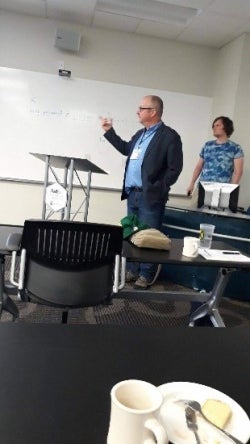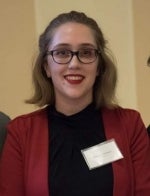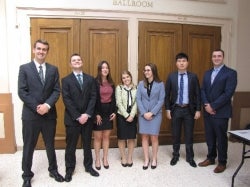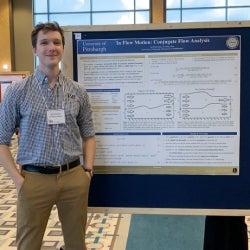Undergraduate
2019 Paul Erdős Lecture Series
Recently Pitt Math Major Graham Zug had the honor of presenting at the 2019 Paul Erdὄs Lecture Series at the University of Memphis. This four-day, world-class conference in Combinatorics and Number Theory featured many big names in both mathematical areas as well as Fields Medalist Enrico  Bombieri and offered both a poster and speaking session for students and early researchers. Graham delivered his talk "Modular Hashing and the Collatz conjecture" on one of the important problems in mathematics. Of the 12 speakers that day, Graham was the only undergraduate with the other 11 speakers the likes of Ph.D. students and post-docs from Princeton, Cambridge, etc.
Bombieri and offered both a poster and speaking session for students and early researchers. Graham delivered his talk "Modular Hashing and the Collatz conjecture" on one of the important problems in mathematics. Of the 12 speakers that day, Graham was the only undergraduate with the other 11 speakers the likes of Ph.D. students and post-docs from Princeton, Cambridge, etc.
Graham was introduced to the problem in Dr. Wheeler's Discrete Structures course and came up with his idea while taking Dr. Wheeler's Combinatorics course. Graham approached Dr. Wheeler with some thoughts on approaching the problem and Dr. Wheeler encouraged him to explore them. Pictured is Dr. Wheeler introducing Graham at the conference.
Graham did not prove the conjecture, but his clever approach to the problem was well-received by the audience. His abstract is included:
Abstract: Choose a positive integer. If it is odd, multiply it by three and add one. If it is even, divide it by two. The Collatz conjecture is a decades old conjecture that states that for all positive integers, if you repeat this process, you will eventually reach one. In computer science, a hash function is a function that is used to map data values into organized ``buckets'', so that the information in the buckets can be easily retrieved later. These two concepts are seemingly unrelated. In this talk, we will discuss a proof that shows that if a certain set of hash functions distribute given values over a certain number of buckets evenly, then the Collatz conjecture is false.
Ian Pamerleau attends Summer Undergraduate Research Symposium
Ian Pamerleau received the NASA Pennsylvania Space Grant Consortium (PASGC) in the spring to work with Dr. Ming Chen on Conjugate Flow Analysis. Since then, he has been working to understand more and expand on the topic. For the PASGC, Ian had the opportunity to prepare a poster presentation for the 22nd Annual Summer Undergraduate Research Symposium at Duquesne University. There were a total of 172 posters at the event and students from all over the country including Puerto Rico participated. Students explained their research to peers, graduate students, and professors, similar in format to the MathFest Poster Session that our department hosts each spring.
Dr. Clark of the Department of Physics and Astronomy here at Pitt had this to say about Ian's Poster:
“Ian Pamerleau presented a poster on his research work with Dr. Ming Chen at the 2019 Duquesne University Summer Undergraduate Research Symposium on Friday, July 26th. The topic of his poster was “Conjugate Flow Analysis”, and I talked to him at length about his work. Both his poster, and his presentation of his research were very informative and engaging.”
Ian has provided a brief summary of his reasearch:
"I worked with Dr. Ming Chen this summer to study Conjugate Flow Analysis. We studied traveling waves that propagated through a two-layer fluid that is bounded below by a rigid bottom and allowed to move freely at the surface. We seek conditions between the upstream and downstream (initial and final) states that support solitary waves (which are limited to the same states up- and downstream). The flow must be solitary, i.e. it must conserve mass, momentum and energy. We will find algebraic relations between the two states using dimensionless values like height, density and depth ratio as well as the dimensionless wave speed. We were able to find relations, however, we are now in the process of simplification and reduction of the expressions."
Math Majors Summer Internship
Every Summer our math majors look to take their math skills out of the classroom and put them to good use in internships and research experiences. From the many tales our students have told us of their internship experiences this summer we have selected two to share here.
Mariya Savinov
Mariya is a double major in Math and Physics. Last summer, she worked as a Research Assistant at Humboldt University in Berlin. Mariya's work was supported by a DAAD Research Internship in Science and Engineering fellowship. Under these fellowships, students conduct research in Germany for an average of 12 weeks. Mariya worked in the Collective Behavior lab group in the Institute of Theoretical Biology. Asked to comment on her experience and share her take-aways from her experience, she told us:
 “Participating in internship and research programs will help undergraduates identify their post-grad plans with certainty other students simply cannot achieve.
“Participating in internship and research programs will help undergraduates identify their post-grad plans with certainty other students simply cannot achieve.
My internship in Berlin exposed me to a new area of study in bio physics/mathematical biology, giving me further research experience that will prepare me for graduate school.
I gained significant network connections, experience in living in new cities, and great friends.”
Luke Gorman
Luke is a Math major with a minor in Political Science. Last summer, he completed an Internship in the Office of Senator Vincent Hughes of the PA State Senate. Senator Hughes is the Minority Chair of the Appropriations Committee, meaning that he works a lot on the budget. Luke gained a first-hand look at how the budget is handled, and how the minority party gets sway in the budget process. Putting his problem solving and data analysis skills to good use he helped write legislation on Prison Gerrymandering backed by an immense amount of population data that he collected. He explained,
 “I felt I had a hand in something very important. The state budget affects the lives of millions of Pennsylvanians, and the fact that I played a small part in passing it made me feel like I had made the lives of a lot of people better.
“I felt I had a hand in something very important. The state budget affects the lives of millions of Pennsylvanians, and the fact that I played a small part in passing it made me feel like I had made the lives of a lot of people better.
This internship taught me to think on my feet. You had no idea where one day could take you, you could be doing anything from writing talking points to actual legislation. Being adaptable to the situation was very important to being successful.”
Actuarial Job Fair

The University of Pittsburgh’s Actuarial Fraternity, Gamma Iota Sigma (GIS), held their annual Actuarial Career Fair on Monday, September 30th in the William Pitt Union Ballroom. While the career fair was held from 1:00 PM to 3:00 PM, career advancing activities began much earlier. The hard work of the GIS executive board was essential in the planning and execution of this year’s career fair. All in all, fifteen companies recruiting future actuaries attended the career fair. During the career fair students seeking to advance their actuarial career had the opportunity to speak with representatives from various companies in the insurance and consulting industries.

In addition to the main career fair, Gamma Iota Sigma members had the opportunity to share their names and accomplishments with the attending companies prior to the career fair though the club’s resume book. Attending companies were then able to schedule interviews to be held both before and after the career fair. This year’s career fair was a great success, allowing for students and companies to communicate and share information, effectively planting the seeds for many productive professional relationships.
Undergraduate Contest: Problem of the Month
This academic year we started a monthly contest for undergraduate students. At the beginning of each month, one problem is circulated with our majors and posted on the departmental website. Submissions of solutions are accepted until the end of the month, and a winner is selected in a random drawing from all eligible entries that contain a full and correct solution. So far, the winners are: Gregory P Constantine (September) and Jacob McKibbin (October).
